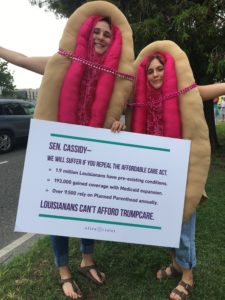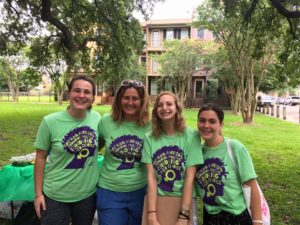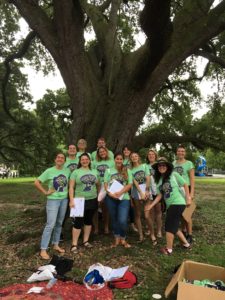This summer, I’d say I’ve completed a thorough introductory education not only in reproductive justice, but also in community organizing. I started with conducting personal research, shifted to attending community events, and ended with organizing NOAF’s first-ever community canvass. In organizing this canvass, I learned how much of a team effort organizing should be.
Developing our canvassing script, for instance, was a five person project. Hannah Cohen, another NOAF intern, brought her professional canvassing experience to the table and helped me create the canvassing script’s initial draft. Another NOAF third intern, Paloma Pinto, brought her communications background to the table and proposed some effective edits. Ben Zucker from Step Up Louisiana contributed perspective from his organization’s membership-based grassroots strategy and his background as a union organizer to ideate before the script’s drafting phase and to streamline the script later on. NOAF board member Maria Wickstrom contributed her extensive labor organizing experience with some final edits. This extensive drafting process allowed me to grow not only in my teamwork abilities, but in my understanding of the importance of strategic messaging to culture change and community engagement.
The soft launch of our canvassing campaign was terribly successful, largely due to our well-thought out messaging strategy. Instead of canvassing with a specifically pro-abortion message, we focused on the issue of the loud, obnoxious anti-choice protesters who camp out outside the Women’s Health Care Center to harass patients and neighbors each morning. In this way, we were able to identify and connect with NOAF supporters in the neighborhood. However, we were also able to call in neighbors who were pro-life or undecided but agreed that the protesters were disturbing their community to the detriment of clinic patients, patients of the 20 nearby health care providers, their families, and their neighbors.
Though not everyone has the ability to canvass, the time to clinic escort, or the money to donate to the Fund, one thing everyone can do is to begin conversations about abortion. Everyone can start to normalize the word “abortion” and experiences surrounding abortion among your families, friends, and peers. Abortion is not nearly as rare as one might expect. One in three US women will obtain an abortion at some point in her life. You can even take it one step further and host a house party through NOAF’s OutLoud Story Sharing program. I’ve learned this summer that these conversations are an essential component to changing hearts, and it’s nearly impossible to change minds without changing hearts first.



